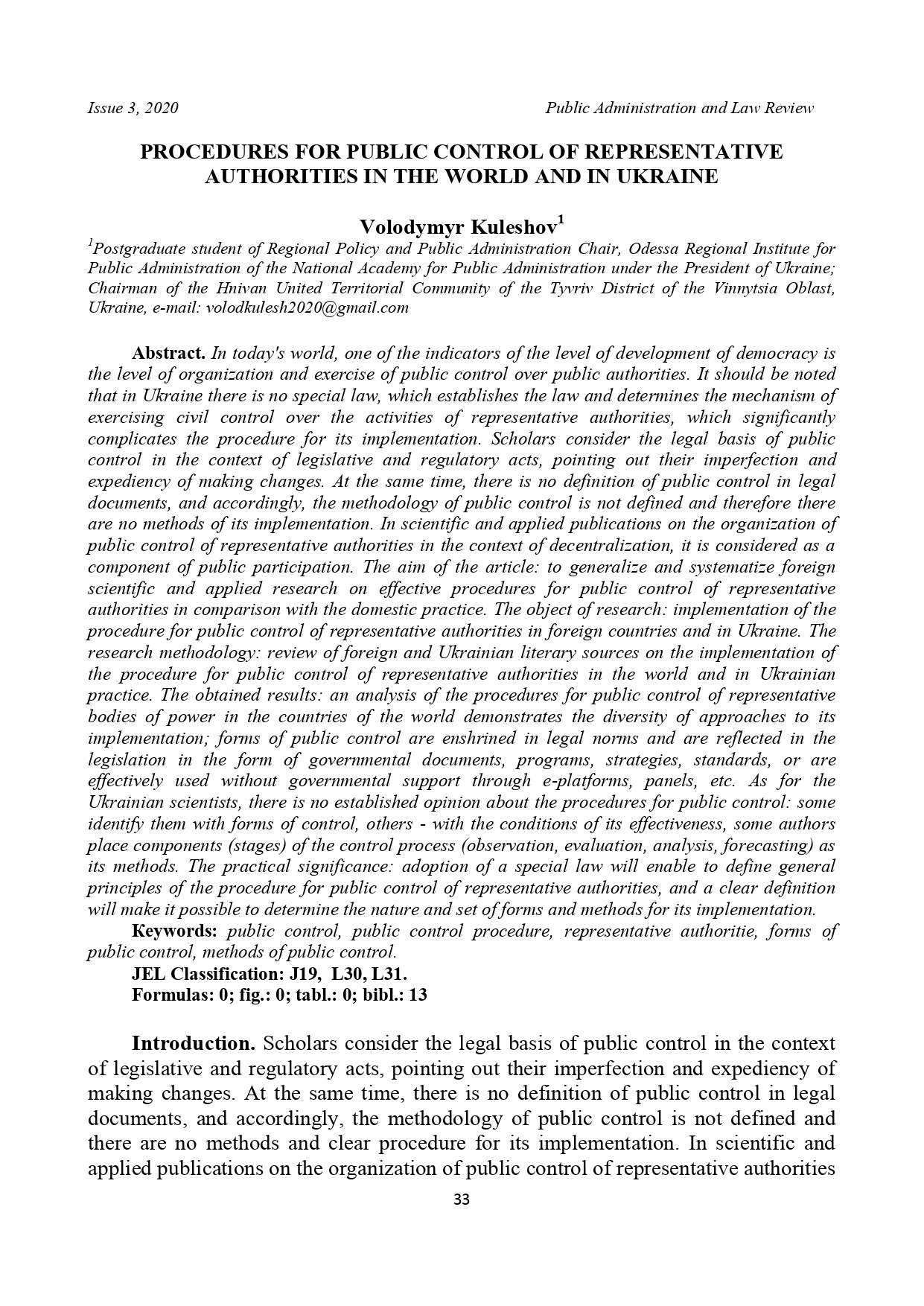PROCEDURES FOR PUBLIC CONTROL OF REPRESENTATIVE AUTHORITIES IN THE WORLD AND IN UKRAINE
DOI:
https://doi.org/10.36690/2674-5216-2020-3-33Keywords:
public control, public control procedure, representative authoritie, forms of public control, methods of public controlAbstract
In today's world, one of the indicators of the level of development of democracy is the level of organization and exercise of public control over public authorities. It should be noted that in Ukraine there is no special law, which establishes the law and determines the mechanism of exercising civil control over the activities of representative authorities, which significantly complicates the procedure for its implementation. Scholars consider the legal basis of public control in the context of legislative and regulatory acts, pointing out their imperfection and expediency of making changes. At the same time, there is no definition of public control in legal documents, and accordingly, the methodology of public control is not defined and therefore there are no methods of its implementation. In scientific and applied publications on the organization of public control of representative authorities in the context of decentralization, it is considered as a component of public participation. The aim of the article: to generalize and systematize foreign scientific and applied research on effective procedures for public control of representative authorities in comparison with the domestic practice. The object of research: implementation of the procedure for public control of representative authorities in foreign countries and in Ukraine. The research methodology: review of foreign and Ukrainian literary sources on the implementation of the procedure for public control of representative authorities in the world and in Ukrainian practice. The obtained results: an analysis of the procedures for public control of representative bodies of power in the countries of the world demonstrates the diversity of approaches to its implementation; forms of public control are enshrined in legal norms and are reflected in the legislation in the form of governmental documents, programs, strategies, standards, or are effectively used without governmental support through e-platforms, panels, etc. As for the Ukrainian scientists, there is no established opinion about the procedures for public control: some identify them with forms of control, others - with the conditions of its effectiveness, some authors place components (stages) of the control process (observation, evaluation, analysis, forecasting) as its methods. The practical significance: adoption of a special law will enable to define general principles of the procedure for public control of representative authorities, and a clear definition will make it possible to determine the nature and set of forms and methods for its implementation.
Downloads
References
The System of Public Administration of Canada: Experience for Ukraine / comp. O.I. Maximov; general ed. Yu. V. Kovbasyuk. Kyiv: NAPA, 2010. 60 p.
Civic participation in decision-making: An overview of standards and practices in Council of Europe member states. Strasbourg, May, 2016. Retrieved from: https://rm.coe.int/civil-participation-in-decision-making-processes-an-overview-of-standa/1680701801.
Boklag, V., & Pavlenko A. (2017). Public control in the context of unification of territorial communities and decentralization in Ukraine. Actual problems of public administration. №1 (51). Retrieved from: http://www.irbis-nbuv.gov.ua/cgi-bin/irbis_nbuv/cgiirbis_64.exe?I21DBN=LINK&P21DBN=UJRN&Z21ID=&S21REF=10&S21CNR=20&S21STN=1&S21FMT=ASP_meta&C21COM=S&2_S21P03=FILA=&2_S21STR=apdy_2017_1_11.
Nalyvayko L., & Oreshkova A. (2016). Public expertise of the activities of public power bodies in the context of modernization of the Ukrainian society. Young scientist. № 2 (29). Retrieved from: http://molodyvcheny.in.ua/files/journal/2016/2/48.pdf.
Jan-Hendrik Kamlage, & Patrizia Nanz. (2019). Public Participation and Democratic Innovations: Assessing Democratic Institutions and Processes for Deepening and Increased Public Participation in Political Decision-Making. Retrieved from: https://rm.coe.int/public-participation-and-democratic-innovations-assessing-democratic-i/168075f47b.
More about local democracy. (2011). Retrieved from: https://www.regjeringen.no/en/topics/elections-and-democracy/lokaldemokrati/the-mayor/id550479.
Sveinung Arnesen, & Yvette Peters. (2017). The Legitimacy of Representation: How Descriptive, Formal, and Responsiveness Representation Affect the Acceptability of Political Decisions. Comparative Political Studies. № 51. P. 868-899. Retrieved from: https://journals.sagepub.com/doi/full/10.1177/0010414017720702.
The Swedish system of government. (2003). Retrieved from: https://sweden.se/society/the-swedish-system-of-government.
Coleman D. (2016). Australian public needs to wrest more control back off the government. Retrieved from: https://www.afr.com/policy/australian-public-needs-to-wrest-more-control-back-off-the-government-20160821-gqxixc
Participatory democracy tools: European standards and practices. (2017). Retrieved from: http://www.slg-coe.org.ua/wp-content/uploads/2017/04/CoE_Opinion_Participatorydemocracy_SAGUD-LPO20171_.pdf

Additional Files
Published
How to Cite
Issue
Section
License
Copyright (c) 2020 Scientific Center of Innovative Researches OÜ

This work is licensed under a Creative Commons Attribution 4.0 International License.





